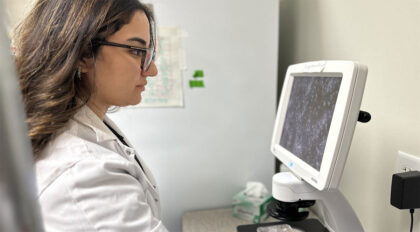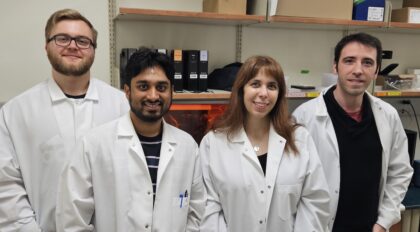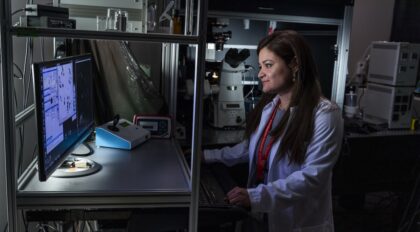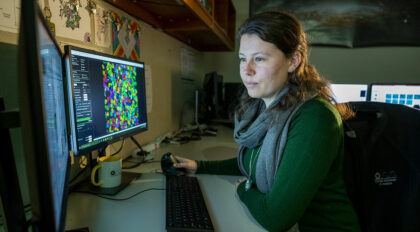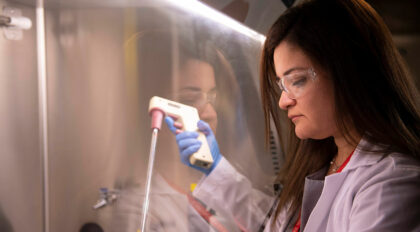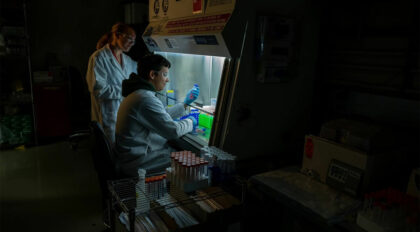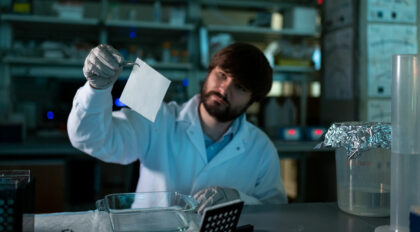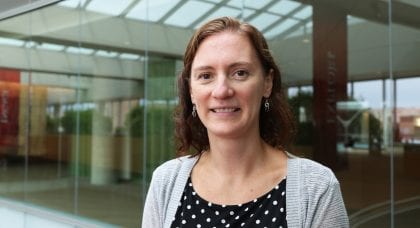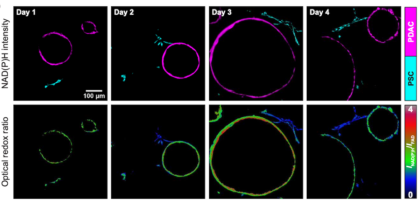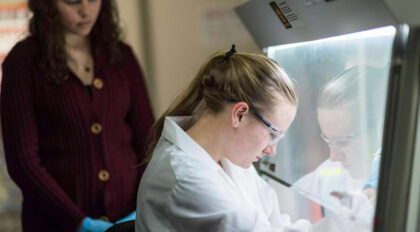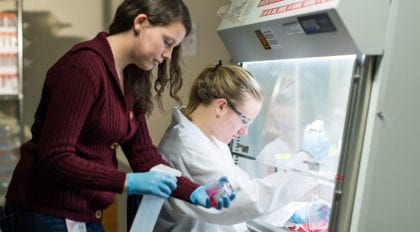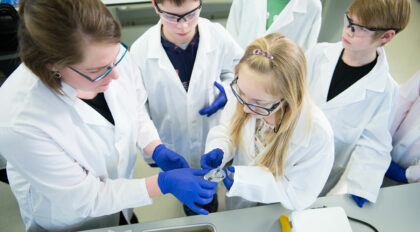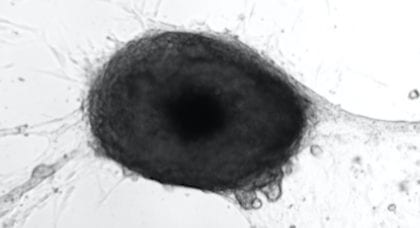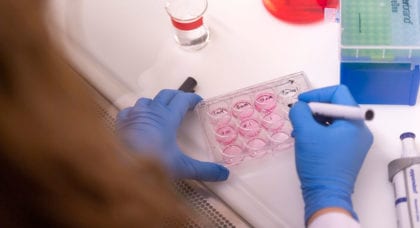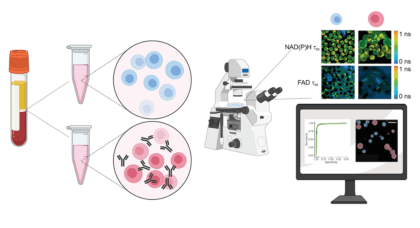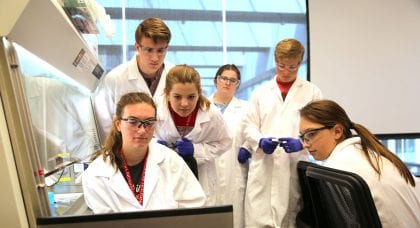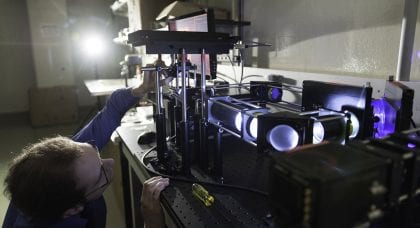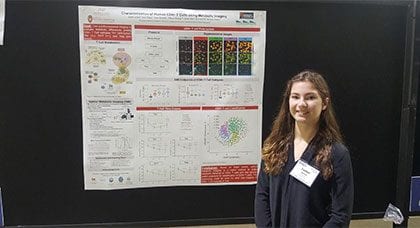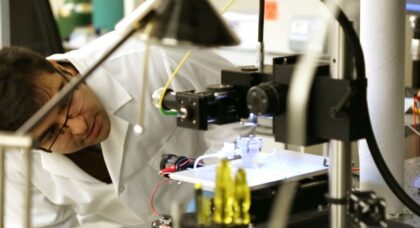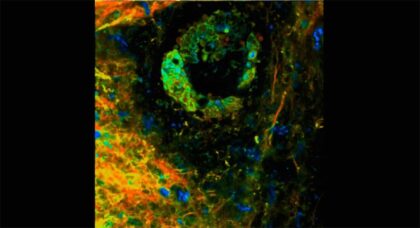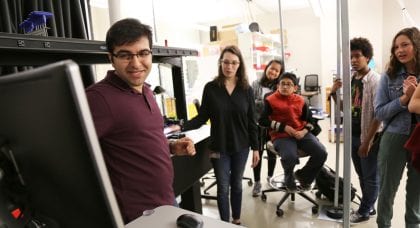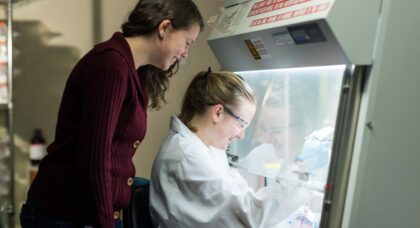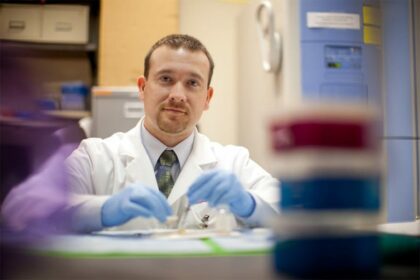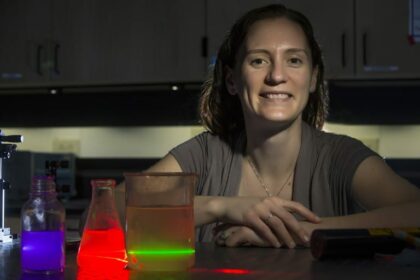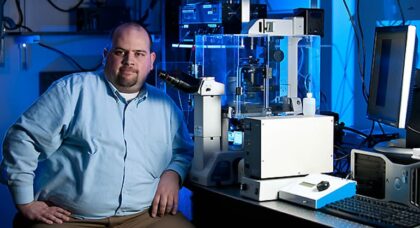Tag: Optical Microscopy in Medicine Lab
Rising Sparks: Sabina Farhadova, biomedical imaging
Working with investigators Melissa Skala and Darcie Moore, Farhadova will use cutting-edge imaging technologies to answer fundamental questions about neurogenesis – the process by which new neurons are generated in the brain – and stem cell biology.
Rising Sparks: Jose Ayuso, biomedical imaging alum
Morgridge alum Jose Ayuso is an assistant professor in UW–Madison’s Department of Dermatology, where his lab uses advanced biomedical engineering technologies to tap the promise of precision medicine.
Morgridge postdoc breaks down barriers of cancer therapy at Falling Walls Lab Competition
Morgridge postdoc Amani Gillette took center stage at the international Falling Walls Lab Competition, presenting a pitch for SeLight, LLC, her startup focused on CAR T cell therapy research.
Collagen highway signs could show how to stop pancreatic cancer spread
via College of Engineering
University of Wisconsin-Madison biomedical engineers, including Morgridge Investigator Melissa Skala, showed how the alignment of collagen fibers accelerates the movement of clusters of pancreatic cancer cells.
Optical imaging technique gives a closer look at new ways to grow heart cells
Danielle Desa adapted optical imaging techniques she learned with the Melissa Skala Lab to assess the ideal conditions to successfully grow cardiac cells in unique biosynthetic hydrogels.
Rising Sparks: Kasia Wiech, biomedical imaging
Kasia Wiech, a graduate student in biomedical engineering, is on a mission to bring science out of the lab and into public spaces to highlight the impact of science in our everyday lives.
Advanced imaging reveals how a parasitic ‘kiss’ alters cell metabolism
Morgridge researchers harness the power of optical metabolic imaging to study how the parasite Toxoplasma changes host cell metabolism over the course of infection.
The engineering challenges of preterm birth
via The Conversation
In the public affairs news site The Conversation, a trio of engineers (including the Morgridge Institute’s Melissa Skala) describe their research alliance to better understand the biomechanics of pregnancy — and create a better warning system for preterm birth risk.
New biomarkers of response in melanoma immunotherapy
via SPIE
The Skala Lab used quantitative imaging to observe collagen changes in melanoma tumors in mice, offering potential to improve immunotherapy treatments.
Congratulations to our 2024 graduates
Congratulations to our 2024 graduating students and research staff moving on into their next chapters.
Amani Gillette: An entrepreneur’s journey to improve cancer care
Morgridge Postdoc Amani Gillette discusses her fascinating transition from bench science to entrepreneurship as she steers a new company devoted to improving personalized cancer therapies.
Searching for the biomechanical risk factors of preterm birth
Morgridge scientists have developed new imaging and engineering tools to better understand the mechanical triggers of preterm birth — a health challenge that affects more than one in 10 pregnancies nationally.
Skala Lab’s photonics-based imaging featured in UW Health News
via UW Health
Melissa Skala’s technology harnesses the natural light produced by cells in order to track response to cancer drug treatment.
Morgridge Postdoctoral Fellow builds connections with disciplines, peers, and the community
While preparing to launch her career as an independent investigator, Gina Gallego-Lopez explores the relationships between single-celled parasites and their hosts by linking multiple areas of research.
Visualizing metabolic activity of tumor and immune cells with melanoma-bearing mice
A study on metabolic reprogramming in cancer and immune cells is helping scientists better understand the cell interactions surrounding cancer progression — a key to developing more effective and personalized treatments.
Metabolism research has morphed from mundane to essential
At a meeting of the Wisconsin Tech Council, Morgridge scientists described the renaissance taking place in metabolism research, which is revealing newfound connections to disease and entirely new roads to treatment and prevention.
Skala named inaugural Carol Skornicka Chair
Melissa Skala, an investigator in biomedical imaging and professor of biomedical engineering, has been named the inaugural Carol Skornicka Chair at the institute.
Desa named inaugural Melita F. Grunow Postdoctoral Fellow
Danielle Desa seeks to break ground in imaging design and stem cell research with support from the new Melita F. Grunow Postdoctoral Fellowship. She is mentored by Morgridge Investigator Melissa Skala and Biomedical Engineering Professor William Murphy.
A research partnership brings gene editing promise to eye disease
One of the first frontiers of CRISPR gene editing is targeting diseases related to the eye. A diverse Morgridge and UW–Madison team is working to make future applications precise, safe and reproducible.
Skala highlights value of basic research at UW Day in D.C.
Morgridge Institute Investigator Melissa Skala heralded the importance of the federal investment in scientific research during the annual “UW Day” on April 6 in Washington, D.C.
Multiple Morgridge Investigators received prestigious awards in early 2022
Morgridge Investigators Jason Cantor, Kevin Eliceiri, and Melissa Skala received award funding to advance projects in metabolism and biomedical imaging.
Skala to develop new imaging approach for retinal diseases
via College of Engineering
Morgridge investigator Melissa Skala has landed a grant from the National Eye Institute to develop a new imaging method that could allow for earlier disease detection, monitoring and treatment evaluation for retinal diseases.
Optical imaging highlights metabolic interactions that make pancreatic tumor cells grow
An advanced biomedical imaging technique reveals how cancer cells can hijack the metabolic activity of certain non-cancer cells in the pancreas to fuel tumor growth.
Where are they now? Catching up with recent alumni in their new careers
A few of our recent Morgridge alumni reflect on how their research experience at the institute prepared them for their scientific careers.
Imaging method predicts how well stem cells can differentiate into cardiac muscle cells
Morgridge researchers developed an imaging technique that can predict the efficiency of cardiac muscle cell differentiation from stem cells as a method of quality control for potential regenerative therapies.
Serving up summer science
The Summer Science Workshop Series kicks off June 23 with 106 students and 29 educators from 21 schools in the Wisconsin Rural Schools Alliance and seven sites in the Upward Bound program that focuses on underrepresented and first-generation pre-college students.
Congratulations to May 2021 Graduates
Congratulations to our 2021 graduating students and research staff moving on into their next chapters. A few of them shared their experiences at Morgridge and their plans for the future.
Imaging technique sheds light on a notoriously slow-growing cancer
Neuroendocrine cancers grow so slowly they often evade detection before it’s too late. By mimicking that slow growth in the lab, the Melissa Skala Lab hopes to speed up the creation of more effective treatments.
Online Field Trips bring science to the state
For more than ten years, the Field Trip Program has brought students and teachers to Madison for a day of activity and exploration. But when the COVID-19 pandemic shuttered on-campus activity, the Discovery Outreach Team had to get creative.
Where are they now? Morgridge alumni look back (and ahead) at their careers
A few of our Morgridge alumni shared thoughts on their research experience at the Morgridge Institute, their plans moving forward and their warm shoutouts to some of the people who helped them along the way.
Amani Gillette: Passing on a fascination with the unknown
Medical Engineering graduate student Amani Gillette has become one of the Morgridge Institute’s top ambassadors for science outreach.
Breaking down barriers to pancreatic cancer care in Wisconsin
Researchers at the Morgridge Institute and UW–Madison want to ensure that pancreatic cancer treatment options are accessible to all — regardless of race, ethnicity, or insurance status — so that patients can make the most informed decisions regarding their care.
Measuring blood flow with a beating “heart-on-a-chip”
With every heartbeat comes a rhythmic pulse that helps blood flow through the body. Understanding this pulsatile flow can offer insights on the impacts of blood vessel development and cardiovascular disease. New research uses an “organ-on-a-chip” model to study pulsatile flow in a more biologically relevant way.
Jose Ayuso wins “Best Paper Award” at the 2020 Micro Total Analysis Systems conference
Morgridge Postdoctoral Fellow Jose Ayuso won the “Best Paper Award” at the 2020 Micro Total Analysis Systems conference for his work on cancer microenvironments in tumor evolution and progression.
New technology tracks role of macrophages in cancer spread
A Morgridge imaging study of macrophages — immune cells that are important to human health, but paradoxically can help some cancers grow and spread — is offering better ways to understand these cells and target them with immunotherapies.
Label-Free Autofluorescence Imaging Method Differentiates Between Active, and Off-Duty T Cells
via Genetic Engineering & Biotechnology News
Researchers at the Morgridge Institute and UW–Madison have developed a novel label-free imaging technique that exploits autofluorescence in cells to differentiate between active and off-duty T cells.
Novel label-free imaging technique brings out the inner light within T cells
A new imaging method developed by the Skala lab uses the natural autofluorescence within cells to assess T cell activity. The technique could help assess T cell involvement in immunotherapies.
Detecting cellular diversity to sharpen personalized cancer treatments
via UW College of Engineering
Melissa Skala, a University of Wisconsin–Madison associate professor of biomedical engineering, and collaborators have used an approach called optical metabolic imaging (OMI) to effectively assess that heterogeneity and related treatment responses in organoids created with tissues from patients with breast cancer and pancreatic cancer.
Congratulations to May 2020 Graduates
Congratulations to the graduating students and research staff as they move onward and upward. A few of these students and staff shared about their time at the Morgridge Institute, their accomplishments and their plans for what’s next.
Skala Lab: New tools for cancer immunotherapy
via WARF
Emerging cell therapies are giving hope to cancer patients, but new analytical tools are desperately needed. Melissa Skala and her team are going all in on the challenge.
To stop pancreatic cancer from spreading, cut out the chatter
via Massive Science
Morgridge investigator Melissa Skala shares her perspective on a promising new approach to treating pancreatic cancer in this feature from Massive Science.
Illuminating Better Cancer Treatments with Light
via Wisconsin Public Television
Peter Favreau, a postdoctoral researcher at the Morgridge Institute for Research, discusses how the use of Optical Microscopy is helping to create individualized effective cancer treatments based on each patient’s tumor cells.
Morgridge-Milwaukee collaboration gets statewide recognition
via Wisconsin State Journal
Tom Still, president of the Wisconsin Technology Council, focused his statewide business column on July 21 on a novel eye research partnership between the Morgridge Institute and Medical College of Wisconsin.
Rural Summer Science Camp expands opportunities, curriculum in its 13th year
The Morgridge Rural Summer Science Camp, where rural high school students and teachers take a deep dive into science research over the course of a week, is expanding and offering a third week of camp thanks to new support from a National Science Foundation (NSF) project.
Novel imaging tech brings together Madison, Milwaukee vision researchers
A Madison-Milwaukee scientific partnership is powering an effort to better understand the complicated mechanics of human vision.
Conferences are Important for High School Students—Youth Apprentices and STEM Professional Development
via Promega Connections
Isabel Jones, Verona Area High School senior and second year YA, who works at the Morgridge Institute for Research, presented a scientific poster at one conference and spoke on a panel at another.
Improving the odds: Researchers develop novel device to study early stage of breast cancer
Imagine your chances of developing an invasive cancer were the same as a coin toss. Do you opt for aggressive treatments like surgery and chemotherapy, or do you take your chances that the cancer will never manifest?
Turning T cells into better cancer assassins
Alexandra Walsh, an assistant scientist in the lab of Morgridge medical engineer Melissa Skala, is leading a project to use non-invasive fluorescence imaging to identify and sort T cells for use in cancer immunotherapy treatments. The technology won a 2018 Innovation Award from the Wisconsin Alumni Research Foundation.
UW researchers, doctors trying to better predict preterm birth
via Wisconsin State Journal
Preterm births — which can lead to infant death or disability — are on the rise, accounting for nearly 400,000 of the country’s 4 million annual births. But doctors have a hard time figuring out which pregnant women are likely to deliver early.
Scientists seek to improve quality control for genome editing therapies in the eye
via UW–Madison
As gene editing therapies for macular degeneration and other visual disorders work their way into clinical trials, the University of Wisconsin–Madison is on the forefront of research into making sure they are safe and effective.
Morgridge, Meriter research project targets the persistent risk of preterm birth
Of the approximately 4 million births in the United States each year, at least 400,000 of them still trigger a state of desperation in maternity wards. Parents, doctors and medical staff feel this way over the challenge of managing high-risk pregnancies.
Trio of Morgridge Institute medical researchers to speak at Sept. 25 Innovation Network luncheon
via Wisconsin Technology Council
Three scientists at the Morgridge Institute for Research will describe what brought them to Madison and how breakthroughs in medical engineering, regenerative biology and medical imaging will help save lives at the Tuesday, Sept. 25 Tech Council Innovation Network luncheon meeting in Madison.
Pushing toward personalized pancreatic cancer treatments
Melissa Skala and Paul Campagnola, a professor of biomedical engineering at UW–Madison, hope to make inroads toward improved drug therapies through a two-year National Institutes of Health Exploratory/Developmental Research Grant.
UW Carbone Cancer Center Study to look for ways to personalize therapy in colorectal cancer
via School of Medicine and Public Health
The study will use optical imaging techniques developed by Melissa Skala, a co-investigator at the Morgridge Institute, to monitor the evolution of 3D cancer tumor cultures over time.
HOSA students tackle tough subject
via Wisconsin State Journal
Dane County high school students visited the Skala Lab to tackle pancreatic cancer, the third-leading cause of cancer deaths in Wisconsin.
Congratulations to our graduating students
With the semester winding down, we are thrilled to congratulate graduating students and research staff who are moving on and up. More than 110 undergraduate and graduate students, in addition to post-doctoral fellows, work across six biomedical research themes at the Morgridge Institute.
Mentoring at Morgridge
When Ava VanDommelen was seven, she asked for her first microscope for Christmas. Now, at 17-years-old, she’s using microscopy to explore cancer tumors and the immune system at the Morgridge Institute for Research.
Morgridge researcher scores in cancer research ‘lightning round’
Melissa Skala, a Morgridge Institute for Research investigator in medical engineering, won a highly competitive award from the nonprofit organization Stand Up to Cancer at its annual 2017 summit January in Santa Monica.
Jose Maria Ayuso Dominguez: A Man of Many Names and Talents
If there were two words that described Jose Dominguez they would be: radiating enthusiasm. It’s easy to see his incredible passion and positivity for his research and life.
Tapping the ‘wild collaboration’ within biomedical engineers
By partnering with the Morgridge Institute for Research, BME landed internationally recognized optical imaging pioneers Melissa Skala and Jan Huisken to their new faculty ranks.
Getting personal with pancreatic cancer
Oncologists are struggling to improve the grim survival rates of pancreatic cancer, which are especially frustrating in an era that is making good progress on other cancer fronts. “I think
Melissa Skala: Follow the Light to Better Cancer Treatment
Skala’s research problems focus on cancer detection and treatment, and her expertise in light-based, optical imaging is giving clinicians revolutionary new tools for the fight. Skala will be bringing her talents this summer from Vanderbilt University to the Morgridge Institute for Research and the University of Wisconsin–Madison, as a Morgridge investigator and professor of Biomedical Engineering (BME).
Kevin Eliceiri to bring multi-scale imaging focus to Morgridge Institute
Scientific imaging has long been a research strength at the University of Wisconsin–Madison, home of major advances in cellular-scale optical imaging, human-scale medical imaging and many spaces in between.
